Gender-based violence is a violation of fundamental human rights. Linked to gender inequalities, the violence represents a major obstacle to the achievement of full equality. According to the European Union Agency for Fundamental Rights (FRA), one in three women in Europe has experienced gender-based violence in their lifetime, a staggering statistic that underscores the urgency of the issue. “This is the same number as 10 years ago, which suggests that EU Member States still have a lot to do in tackling violence against women.”, said Sami Nevala, Project Manager at the Fundamental Rights Agency.
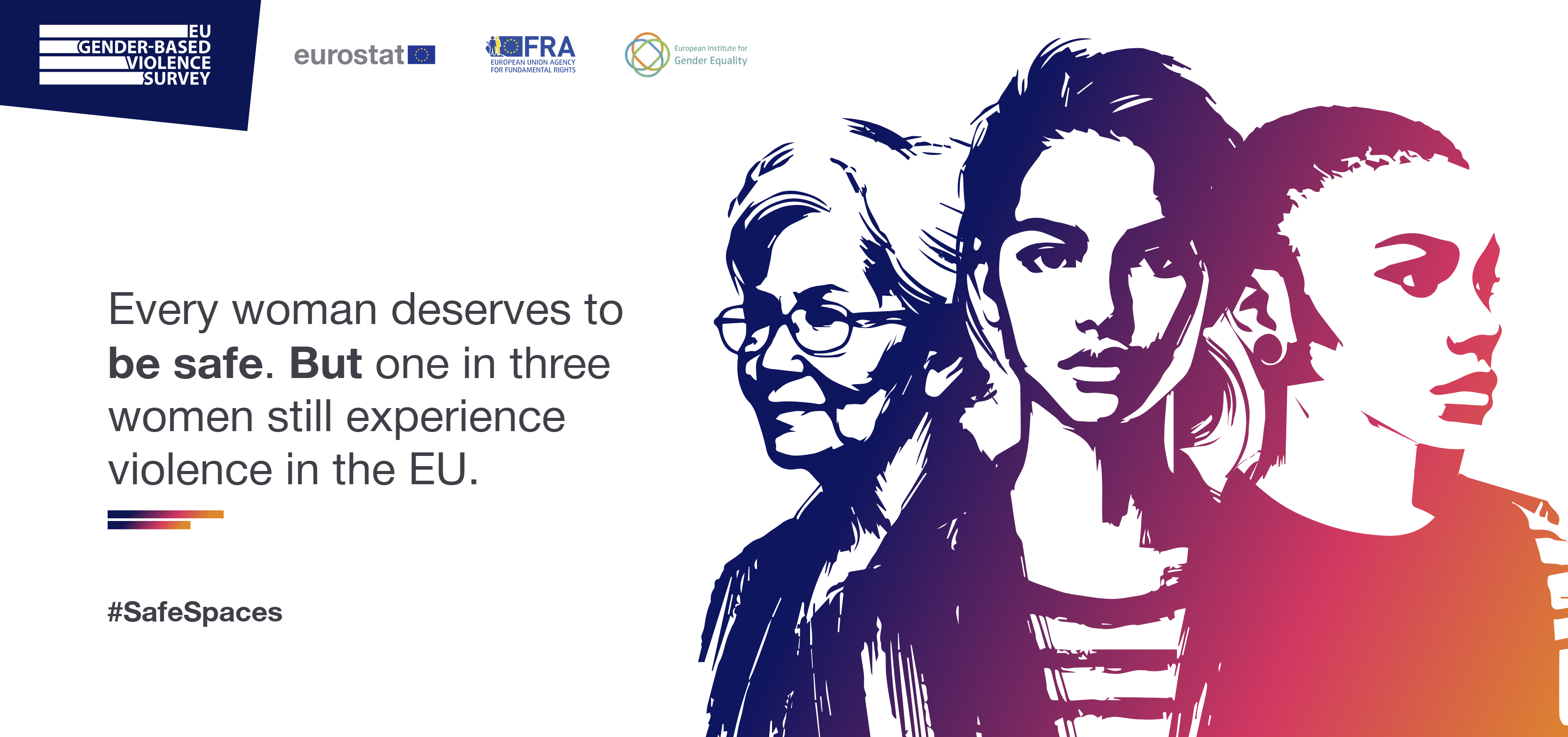
Visual from the EU gender-based violence survey campaign published by the Fundamental Rights agency (FRA), European Institute on Gender Equality and Eurostat in 2024. Photo credits: FRA.
According to the Violence Against Women Survey, conducted by the FRA, the European Institute for Gender Equality (EIGE) and Eurostat, approximately 31% of women in the EU have endured physical or sexual violence. Women aged 18 to 29 are most affected, but many cases still go unreported. In response, the EU has adopted its first-ever Directive on Combating Violence Against Women and Domestic Violence, which came into force in May 2024. The directive criminalizes several forms of violence, including female genital mutilation, forced marriage, and cyberviolence such as cyberstalking and non-consensual sharing of intimate images. “This directive doesn’t just set new standards – it demands action. By establishing clear legal frameworks and comprehensive measures, it empowers member states to prevent violence, protect survivors, and hold perpetrators accountable,” said Lisa Collste, Legal Officer at the European Commission’s Gender Equality Unit.
Having a robust legal framework is key to tackle the root causes of the problem. “If we want to create a violence-free society, we have to ensure that there is no concession for violence”, said Zuzanna Rudzińska-Bluszcz, Deputy State Secretary, Ministry of Justice European Union.
But the first steps in adopting a comprehensive Europe framework setting out the standards on prevention, protection, prosecution and integrated policies were taken in 2014, with the adoption of the Convention on preventing and combating violence against women and domestic violence (also known as the Istanbul Convention). “The Istanbul Convention represents the gold standard for combating violence against women,” added Marja Ruotanen, Director General of Democracy and Human Dignity at the Council of Europe.
This Convention was the first instrument in Europe to set legally binding standards to prevent gender-based violence, protect victims, hold perpetrators accountable, and implement comprehensive policies to combat the violence. In addition, the new directive not only enhances the EU’s commitment to tackling gender-based violence also aligns closely with the Istanbul Convention’s principles, further reinforcing international cooperation in this field.
The SYNERGY Network has been instrumental in promoting these standards across Europe, fostering practical implementation in beneficiary states. Marja Ruotanen, Director General of Democracy and Human Dignity at the Council of Europe.
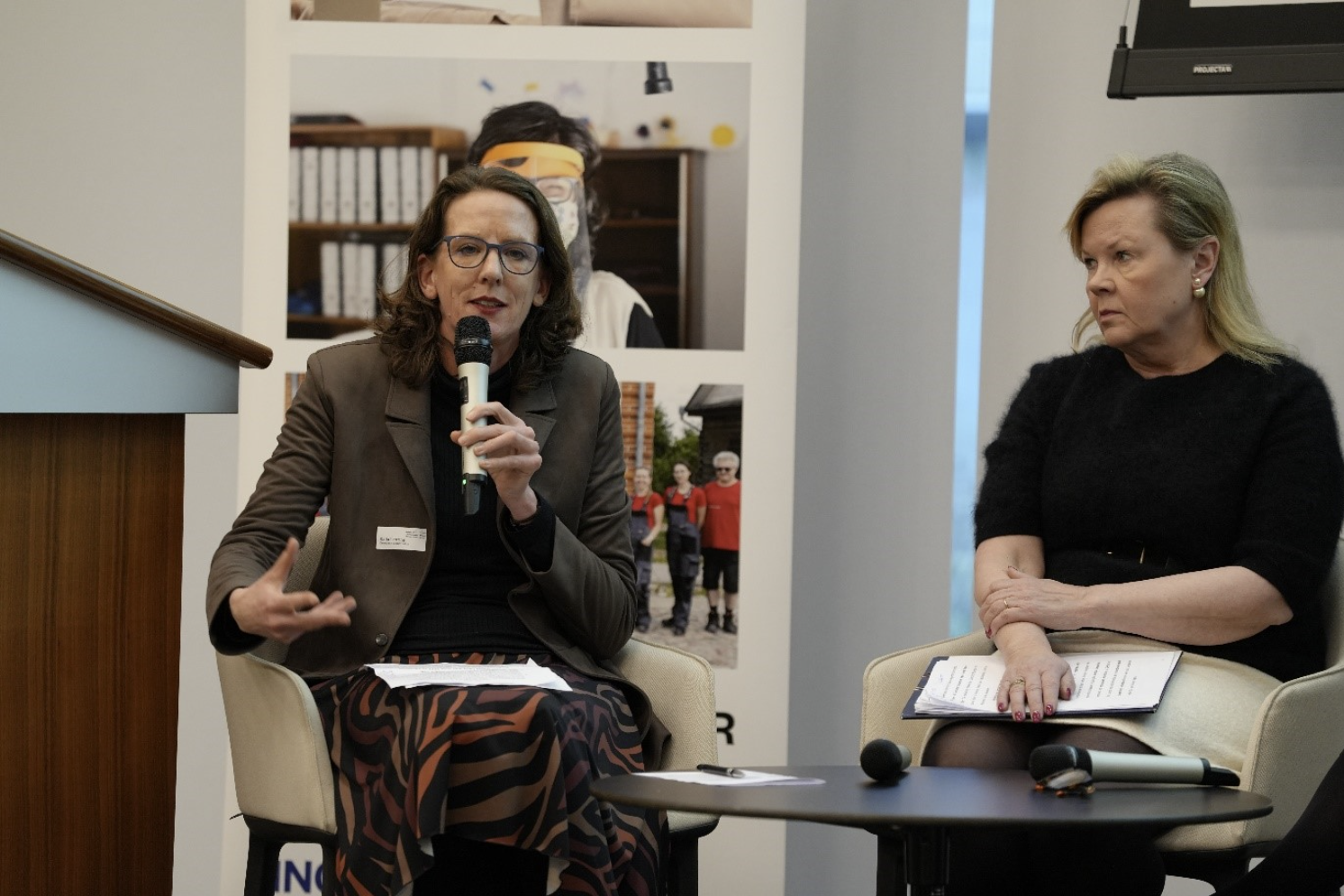
Panel debate with Katja Lenzing (European Commission) and Marja Ruotanen (Council of Europe), from left to right, at the Synergy Network conference celebrated in Brussels on 20 – 21 January 2025 at the EFTA House. Photo credits: EEA and Norway Grants.
#SynergyNetwork: the key to counter gender-based violence in Europe
At the heart of Europe’s efforts to address this crisis lies the Synergy Network. This platform, coordinated by the Norwegian Ministry of Justice and Public Security and supported by the EEA and Norway Grants, has been instrumental in fostering partnerships to combat domestic and gender-based violence (DGBV) across Europe.
The network brings together diverse stakeholders, including representatives working in various programmes supported by the Grants, including Donor Programme and project partners, civil society representatives, Programme Operators, Fund Operators of the Active Citizens Fund, and international organisations. Actors like the Norwegian police, the Norwegian Courts Administration, the Norwegian Directorate of Health, and the Icelandic Government Agency for Child Protection are also involved, enhancing the capacity to address domestic and gender-based violence by leveraging the expertise and resources of multiple stakeholders.
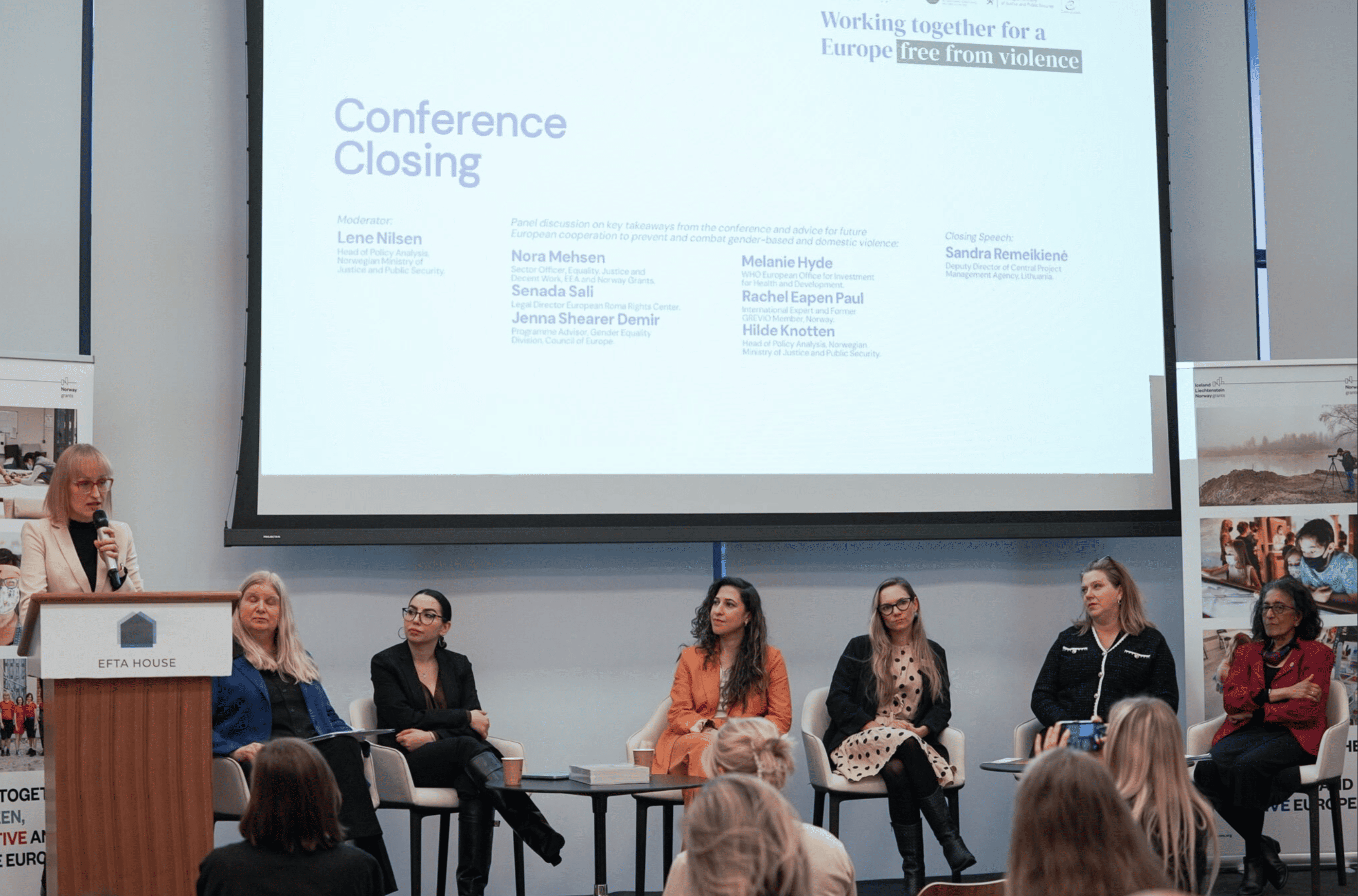 Panel debate at the Synergy Network conference held in Brussels on 20 – 21 January 2025 at the EFTA House. Photo credits: EEA and Norway Grants.
Panel debate at the Synergy Network conference held in Brussels on 20 – 21 January 2025 at the EFTA House. Photo credits: EEA and Norway Grants.
Synergy was the central theme at at the International Synergy Network Conference held in Brussels in January. Organised by the Central Project Management Agency (CPVA) from Lithuania, the Gender Equality Division of the Council of Europe, the Norwegian Ministry of Justice and Public Security and the EEA and Norway Grants, the conference gathered over 100 experts from all over Europe to engage in discussions and presentations on how we can work together for a Europe free from violence.
Decades of support to eradicate gender-based violence
For decades, the EEA and Norway Grants have played a key role in Europe’s efforts to combat domestic and gender-based violence. By supporting legislative reforms, public education, and capacity-building initiatives, the Grants address both the causes and consequences of violence. Their comprehensive approach includes fostering collaboration between police, justice, health, and social services to provide victims with holistic support while equipping professionals with the tools needed to handle cases effectively. Through these efforts, the Grants not only protect victims but also work to break the cycle of violence by challenging societal norms and stereotypes.
Violence knows no borders. That’s why the EEA and Norway Grants invest in partnerships and innovation to build a future free from fear and full of hope. Ragna Fidjestøl, Managing Director of the EEA and Norway Grants
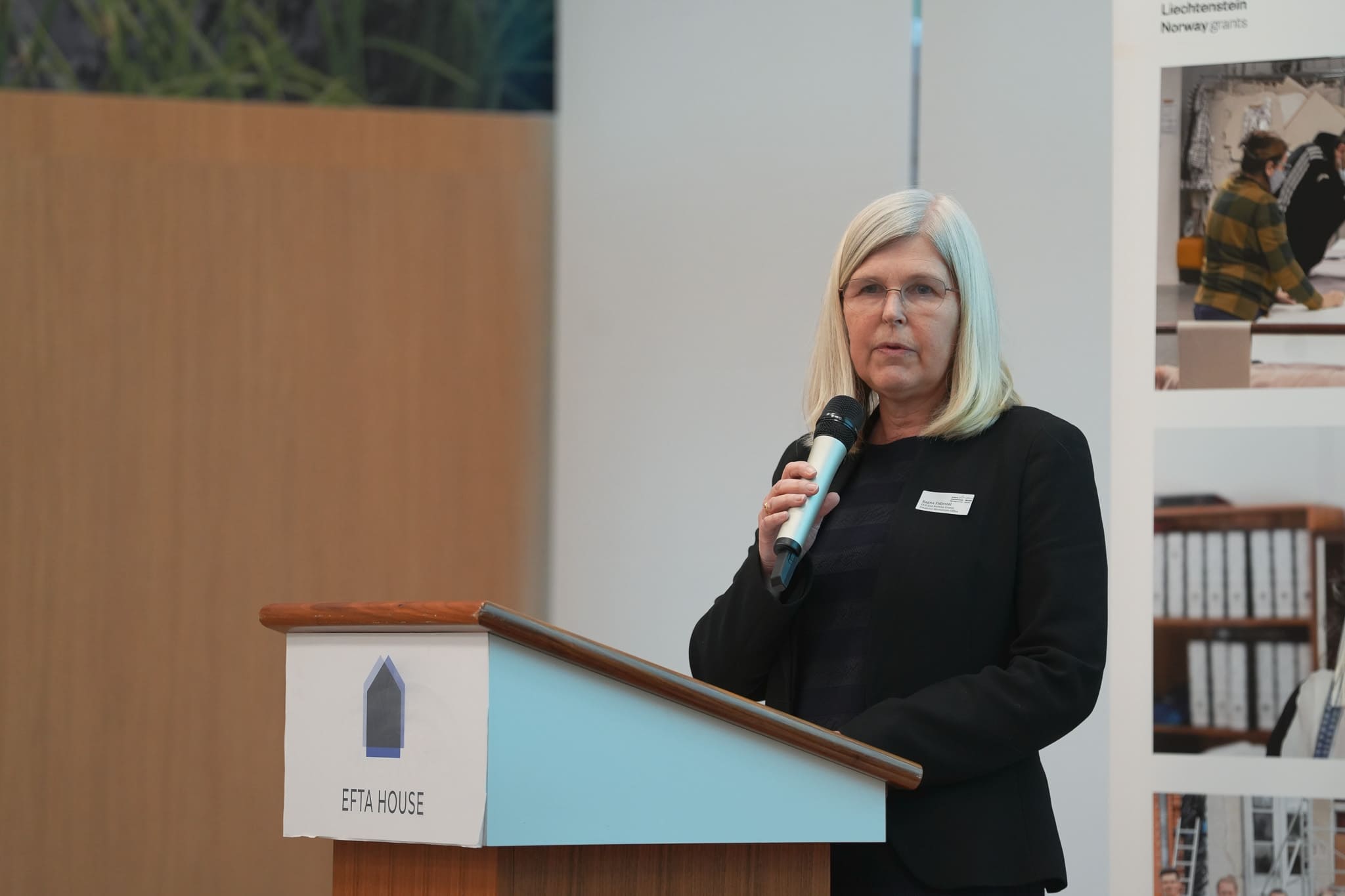
Ragna Fidjestøl, Managing Director of the EEA and Norway Grants at the Synergy Network conference held in Brussels on 20 – 21 January 2025 at the EFTA House. Photo credits: EEA and Norway Grants.
During the 2014-2021 funding period, €26 million were allocated to support projects in nine countries: Bulgaria, Czech Republic, Estonia, Latvia, Lithuania, Poland, Portugal, Romania and Slovakia. These projects helped tackle systemic barriers and provided holistic support for victims.
Some successful initiatives supported by the Grants include Latvia’s adoption of the Barnahus model, which created a child-friendly and integrated justice process for young victims and witnesses of violence, becoming a best practice to be implemented in other countries across Europe. Other successful initiatives include a project in Slovakia which focused on improving access to sexuality education, as well as promoting sexual and reproductive health and rights. In partnership with the Norwegian organisation, Sex og Politikk, the project provided evidence-based and age-appropriate materials for youth, teachers, and parents.
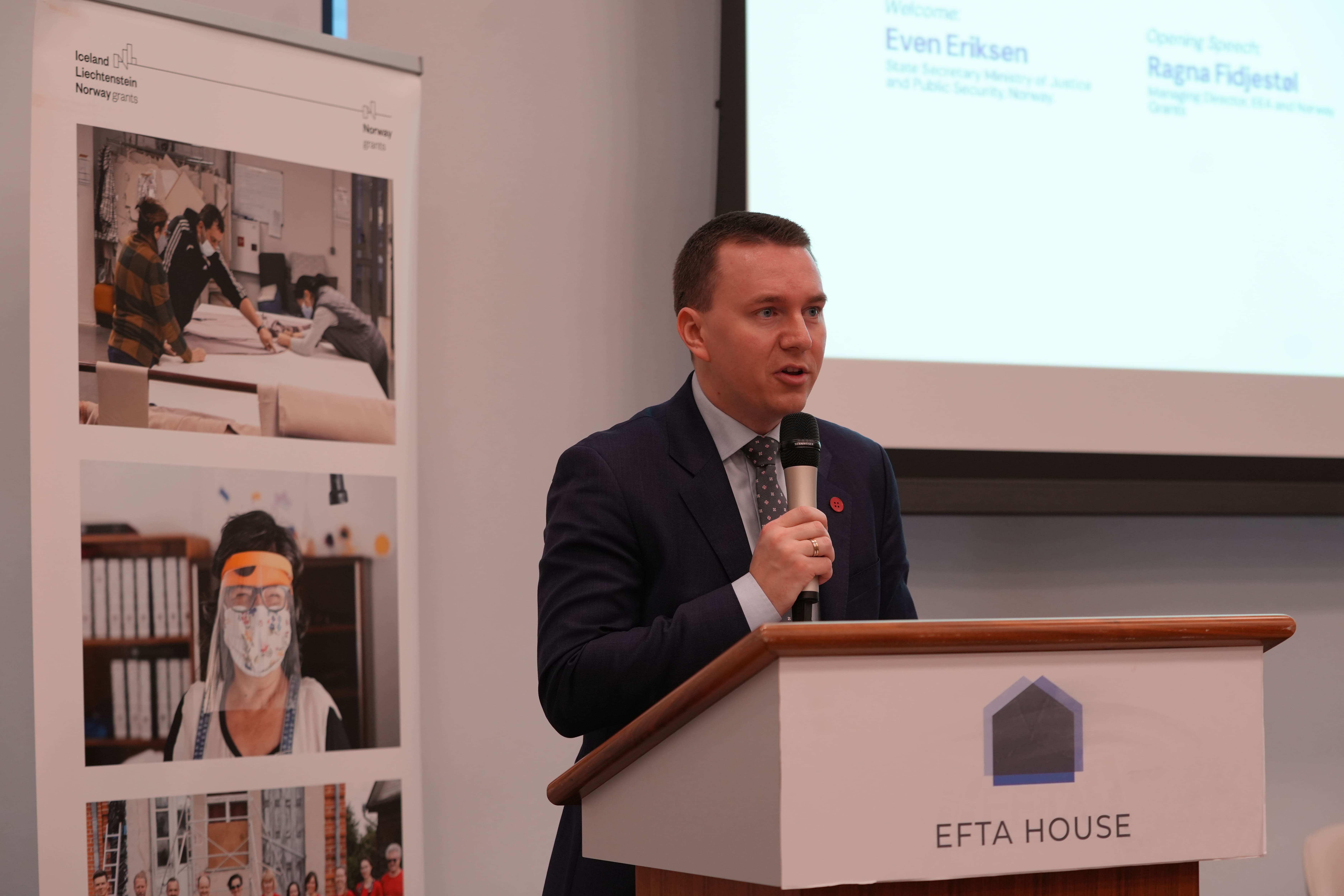
Speech by Even Eriksen, State Secretary for the Norwegian Ministry of Justice and Public Security at the Synergy Network conference held in Brussels on 20 – 21 January 2025 at the EFTA House. Photo credits: EEA and Norway Grants.
The EEA and Norway Grants play a crucial role in preventing and fighting gender-based and domestic violence across Europe. Even Eriksen, State Secretary for the Norwegian Ministry of Justice and Public Security
Strategic partnerships with key institutions
Collaboration with key partners, such as the Council of Europe and the European Commission, has been central to the Grants’ success. The Istanbul Convention, a cornerstone of the Council of Europe’s efforts, provides a comprehensive framework for preventing and combating violence against women.
Katja Lenzing, Deputy Head of Unit in the Gender Equality Unit at the European Commission, highlighted the importance of these synergies: “The EEA and Norway Grants play a very important role in this context. The CERV fund and the Grants are complementary. We need both civil society and state actors to make a difference on the ground in ensuring women and girls victims of violence are protected and supported.”
We’re not there yet
Through partnerships with the Council of Europe, the European Commission, governmental actors, and civil society, the SYNERGY Network remains a vital platform for fostering innovation, sharing best practices, and building a safer, more equitable future for all. Together, these collective efforts offer renewed hope and determination to address the pervasive issue of gender-based violence across Europe.
Looking ahead, the EEA and Norway Grants will keep building on this crucial work during the next funding period—focusing on collaboration, innovation, and the shared goal of ending gender-based violence. Although there’s still a long way to go, these efforts promise meaningful and lasting progress.
Do you want to know more about on the EEA and Norway Grants’ focus on domestic and gender-based violence? Read here.